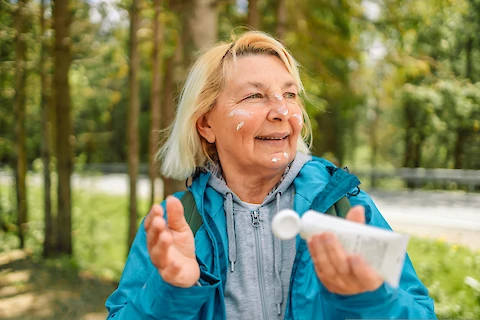
As our loved ones age, skin health becomes more important. Seniors are more susceptible to skin-related issues such as skin cancer, melanoma, and sensitivity. For caretakers and family members, it's important to be aware of the risks associated with these conditions and understand how to effectively mitigate them to ensure your senior loved ones remain healthy and comfortable.
In this blog, we'll discuss the specific concerns related to senior skin care, the increased risks they face, and the responsibilities of caregivers in keeping their charges' skin healthy throughout the seasons.
Increased Risk of Skin Cancer in Seniors
Age is a significant risk factor when it comes to skin cancer. As people grow older, their likelihood of developing the disease increases. One of the reasons for this added risk is the cumulative effect of sun exposure over the years. Additionally, seniors often have weakened immune systems, making it harder for their bodies to fight off cancerous cells.
Melanoma in Seniors
Melanoma, a dangerous form of skin cancer, can also be a concern for seniors. It is crucial to be aware of the signs and symptoms of melanoma. This includes changes in the shape, size, or color of a mole or spot on the skin, the appearance of a new growth, or an existing growth becoming painful or bleeding.
Prevention and early detection are key in the fight against melanoma. Regular skin checks by healthcare professionals or self-examinations can make a difference in catching melanoma early when it is most treatable.
Skin Sensitivity in Seniors
Due to the natural aging process, seniors' skin becomes thinner, drier, and more prone to itching, bruising, and tearing. These changes increase the need for proper skin care and attention to avoid discomfort and potential complications.
Caretaker Responsibilities in Senior Skin Care
Caretakers play a vital role in maintaining the skin health of seniors under their care. Some essentials include:
- Sun protection: Applying sunscreen with an SPF of 30 or higher, even on cloudy days, can help prevent sunburns and reduce the risk of skin cancer. Caretakers can also encourage seniors to wear protective clothing, wide-brimmed hats, and UV-blocking sunglasses to ensure they are shielded from harmful UV rays.
- Moisturizing: Daily application of a gentle, fragrance-free moisturizer can help combat dryness and itching while maintaining the skin's natural moisture barrier.
- Wound care: Cuts and bruises should be treated promptly to prevent infections or further damage to the skin. Keep a well-stocked first-aid kit handy, and monitor any wounds for signs of infection.
- Regular skin checks: Encourage seniors to perform self-examinations or schedule regular check-ups with a healthcare professional to monitor any changes in moles, spots, or any other skin irregularities.
Get Senior Care Assistance From Senior Helpers
Caretakers must remain vigilant in addressing and monitoring the skin care needs of seniors under their care, ensuring their comfort and reducing their risk of skin cancer and other related issues.
For those in Asheville, Hendersonville, Arden, and Fletcher, NC, Senior Helpers Asheville is here to provide the support and assistance you need in caring for your loved ones. Our team of expert caregivers is committed to ensuring your senior family members receive the best possible care. To learn more about our services and how we can help, contact us today!